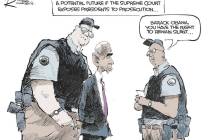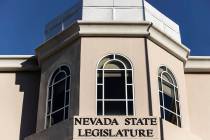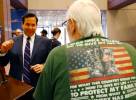Specialized courts
Fairness and openness are the foundation of the justice system. If either are sacrificed to benefit a favored class, the public will lose trust in the integrity of the proceedings.
With so many parties constantly seeking an edge that will result in a favorable outcome, lawmakers must make certain that state statutes grant no special treatment to anyone who enters the courts. In this regard, Assembly Speaker Barbara Buckley's well-intended legislation to create specialized courts for nonviolent military veterans is troublesome.
Thousands of Iraq and Afghanistan veterans are coming home to Nevada suffering from post-traumatic stress disorder, which drives many to abuse drugs and alcohol and commit crimes. A recent Review-Journal series, "The war back home," chronicled returning veterans' struggles with mental disorders, employment and reintegration. These problems bring many men and women in contact with local police.
Southern Nevada courts have shifted case loads to better manage a variety of missions. Specialized departments deal with drug offenders and construction defect litigation, among other niches.
But where these courts address specific types of offenses and civil litigation, Ms. Buckley's plan would create a special class of criminal defendant -- and she proposes giving them protections that aren't available to other offenders.
Assembly Bill 187, which would authorize district courts to establish dockets for veterans and provide a framework for mental health and substance abuse treatment, includes a provision to seal defendants' cases three years after they're discharged from probation. Moreover, the cases could be sealed without a hearing.
Such legislation contradicts recently instituted Supreme Court reforms that ensure openness remains the default setting of the courts. A 2007 Review-Journal investigation revealed District Court judges were sealing scores of civil cases to spare famous, wealthy and powerful defendants from undue embarrassment. Litigation of potential public interest was literally vanishing from the record. Now judges must hold hearings on requests to seal cases, and even if portions of a case are rendered confidential, the identities of the parties involved remain public.
How could the courts be held accountable if, years down the road, citizens were unable to examine the complete record of a veterans docket? That Ms. Buckley, perhaps Carson City's foremost champion of open government, would suggest such secrecy is disconcerting.
The idea of creating efficiencies to better assist troubled veterans is worthy of debate. But those steps must not involve sealing public records and extending favors. Surely, there are better ways to honor and help veterans than to water down the institutions and freedoms they fought for in the first place.























